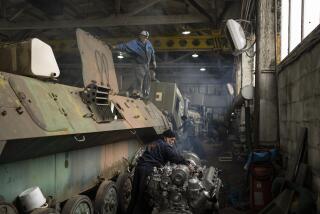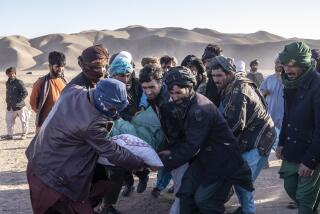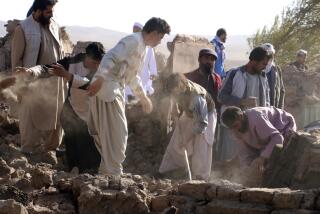Civilians Flee Kabul Under Heavy Shelling : Afghanistan: The new president denounces guerrilla leader Hekmatyar as an ‘outlaw’ who will be crushed if he fails to halt attack.
- Share via
KABUL, Afghanistan — Hundreds of shellshocked civilians began fleeing the Afghan capital in panic Tuesday as the second consecutive day of heavy shelling by dissident Muslim guerrillas killed nearly two dozen men, women and children, closed the international airport and further paralyzed the struggling new government.
As coalition forces supporting interim President Sibghatullah Mojaddidi inside the city shelled positions of extremist guerrilla leader Gulbuddin Hekmatyar to the south, Mojaddidi angrily described Hekmatyar as an “outlaw” who will be crushed “just like dust” if he refuses to break off his attack on the capital.
Mojaddidi, a moderate Muslim scholar turned politician, said his ruling council is trying, through continuing negotiations, to persuade Hekmatyar to lay down his weapons. But, in his first meeting with reporters since the council was installed in Kabul’s urban free-fire zone a week ago, Mojaddidi also insisted that he should serve well beyond his two-month mandate--a position that analysts said would further infuriate Hekmatyar and his fundamentalist faction.
“Thousands of people are coming every day to see me--commanders, tribal leaders . . . the public, the former administration--and everybody is insisting that two months for me is not enough,” Mojaddidi said in the old prime minister’s compound, which he has taken as the presidential home.
“If anybody else comes, the ethnic problem will be raised in Afghanistan, and then Pushtuns won’t accept non-Pushtuns, who won’t accept Pushtuns. . . ,” the president said.
Under the agreement setting up the new government, Mojaddidi is to hold office for two months, then turn over power to another leader of the former resistance. Elections are to be held within two years.
The ethnic divide, an old and deep separation that has kept the nation never far from civil war in the three weeks since the collapse of President Najibullah’s authoritarian regime, has been intensified by the apparent shortage of Pushtuns, members of the long-dominant majority, in Mojaddidi’s ruling coalition.
At the heart of the coalition’s military force is the charismatic Tajik rebel commander Ahmed Shah Masoud and two powerful militias, once attached to the old regime, which are dominated by Tajiks and Uzbeks from the north. Hekmatyar, an ethnic Pushtun, has tried to mobilize popular support for his continuing fundamentalist rebellion largely from among Pushtuns in the south.
Mojaddidi maintained that Hekmatyar’s attempt to divide the nation is doomed to failure, as is his ultimatum that he will take the city by force if the former regime’s militias are not withdrawn.
“He has a lot of weapons. He has a lot of money,” the president said of the fundamentalist Hezb-i-Islami party leader, who received the largest share of U.S.-financed weaponry sent to the Muslim rebels during their years of battle against Soviet invaders and Soviet-style regimes.
“But the people are not with him. . . . If we give the order, Hekmatyar will be just like dust,” he added, squeezing his palms together.
However, there were signs on the streets of the capital Tuesday that Hekmatyar was succeeding not only in terrorizing the city but also in driving its ethnic groups further apart.
“We’re afraid because of the rockets, and we’re afraid because of all the looting and robbing,” said Abdullah, a civil servant and ethnic Pushtun, as he joined hundreds of frantic civilians clambering aboard one of the dozens of overflowing buses and pickup trucks fleeing the capital for the relative safety of the Pushtun-dominated eastern city of Jalalabad.
Abdullah, who said 40 people have been killed in two days of heavy rocketing in his Kalai Zaman Khan neighborhood, said he had answered Mojaddidi’s call to return to work five days ago. But amid the escalating terror, he said, he sent his family to Jalalabad three days ago and finally, on Tuesday, he decided to flee the job he has held for 20 years. “Now, I am unemployed,” he said.
The incessant shelling, which rocked the capital from time to time during the 13 years that Kabul’s Soviet-backed regime battled a combined force of Muslim rebels, is far worse than ever before, Abdullah concluded.
“At that time, these rockets were only in one or another area. Now, Gulbuddin’s men are sending the rockets everywhere--maybe 100 per day. At that time before, the government was quite in control of the situation. Now, the government has no control. . . . They cannot do anything to stop the looting, the robbing. They are powerless.”
In his meeting with reporters, Mojaddidi asserted that efforts are under way to secure the capital and consolidate his council’s power.
In decrees issued during the past two days, Mojaddidi said he is forming a unified military police force of former guerrilla fighters representing eight different rebel factions and led by a well-known commander, Abdul Haq, to oversee the 10,000 armed fighters who have carved the city up into miniature fiefdoms.
“In one week, it is great progress,” he said as the guerrillas who seized the city, piece by piece, 10 days ago continued to enforce their own rules at will.
“All the rates of food have come down. . . . There was no electricity; now there is electricity. There was no water, and water has come up.
“It’s the job of just one week.”
More to Read
Sign up for Essential California
The most important California stories and recommendations in your inbox every morning.
You may occasionally receive promotional content from the Los Angeles Times.










